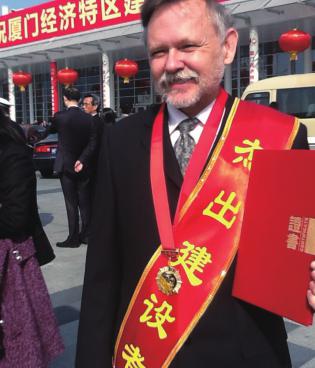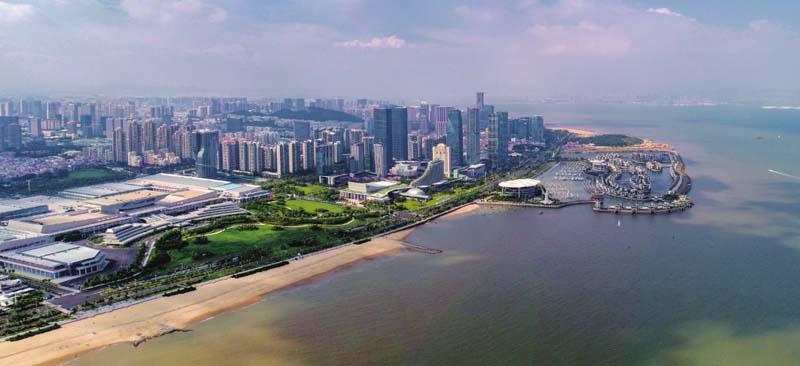Letters Between Homes
2019-03-05ByJiJing
By Ji Jing
This years Spring Festival, which was on February 5, was special for American professor William N. Brown. Four days earlier, he received a letter from Chinese President Xi Jinping, congratulating him on his new book on China.
Brown, who has been living in the coastal city of Xiamen in southeast Chinas Fujian Province for over 30 years, is an MBA professor at Xiamen University. The book, Off the Wall—How We Fell for China, is a collection of 47 letters he wrote to his family and friends in the United States from China. It was published in both English and Chinese by the Foreign Languages Press, a publishing house affiliated to Chinese media conglomerate China International Publishing Group (CIPG), and released in Xiamen University in December 2018.
Brown sent a copy of the book to Xi along with a letter in January.
“I have received your letter and your book. Congratulations on your new book,” Xi said in his note. “Xiamen is an amazing city. It is now your second hometown. I used to work there, and that experience has given me many wonderful memories. You have been a teacher in Xiamen University for 30 years and dedicated a precious time of your life to Chinas education. I am very much moved by your affection for Xiamen and China.”
Xi had worked in Fujian Province for 17 years during 1985-2002.
“As an eyewitness to Chinas reform and opening up, you have represented Xiamen and Fujian Province, and painted a real picture of China for the world. I really appreciate your attitude of integrating into the Chinese community,” the letter continued. “You said in your letter that you are optimistic about Chinas future. I am also confident that you will see a better and more prosperous China that will bring even more benefi ts to the world and humanity, and therefore the Chinese stories you tell in the future will be even more wonderful.”
The book reflects the transformation of China since the reform and opening up as well as the writer and his familys deep affection for the country.
“I am very surprised yet very happy and honored to get a reply from President Xi. Despite shouldering the huge responsibility and pressure of being the president of a country with the largest population in the world, he still managed to write back to an ordinary foreign teacher like me,” Brown told China.org.cn. “I am more than willing to witness Chinas development in the following decades.”
Lu Cairong, Vice President of CIPG, said, “The book has adopted a unique perspective by recording a countrys development through what is going on around the writer. It will help foreigners better understand China.”
Growing roots
Brown speaks fl uent Chinese and loves oolong tea and Fujians local dishes. In 1992, he became the fi rst foreigner to receive permanent residency in Fujian.
Zhang Rong, President of Xiamen University, said at the book launch, “Xiamen University is the fi rst university on the Chinese mainland to open MBA courses and Brown is the first MBA professor in Xiamen University. From this perspective, Brown is also a participant in Chinas reform and opening up.”
While working in Taiwan in the 1970s, Brown became curious about the other side of the Straits.
He sold his fi nancial company in the United States and came to Xiamen in 1988, a decade after the start of the reform and opening up. In the beginning, he just wanted to learn Chinese at Xiamen University for one or two years. However, he fell in love with the city once he arrived there.
“When I moved to Xiamen in 1988 with my wife and children, my family were worried about me and I had to constantly write them letters about Xiamen and China,” Brown told the media in a video interview in February.
Back in 1988, Xiamen was completely different from fast-paced Los Angeles where he had been living. The roads were muddy and bumpy, while there were very few taxis and only three bus lines. The most convenient way of transportation was the tricycle.
When Brown rode his new tricycle, a young couple mistook him for a tricycle driver once and asked him to take them to a local park. The anecdote is included in his new book.
“Now Xiamen has become a modern metropolis where tradition and modernity live in harmony. Like other places in China, its completely changed,” Brown told the media.
Presenting China outside
Browns interaction with Xi started in 1999. At that time, he was receiving treatment for cancer in Hong Kong and Xi, who was then acting governor of Fujian, sent two offi cials to visit him in the hospital.
In 2001, Xi presented Brown the certifi cate for the honorary residentship of Fujian. He also had dinner with Brown after the ceremony and encouraged him to write about Quanzhou, the city that was the starting point of the Maritime Silk Road, since the American had already writ- ten a book on Xiamen.

With a history of more than 2,100 years, the ancient Maritime Silk Road, a sea route of trade and cultural exchanges between China and the rest of the world, extended to ports on the coast of India and Sri Lanka, and went all the way to Europe and the Red Sea. It fell into decline due to the ban on maritime activities in the Ming(1368-1644) and Qing (1644-1911) dynasties.
Under Xis encouragement, Brown engaged in research on Quanzhou and Chinas ancient trade and published a book in 2003, introducing the city to the world. He has written over 10 books and appeared in hundreds of TV shows on Fujian and Xiamen. He has also searched numerous historical documents and old photos about Xiamen in libraries across the world to help the city rediscover its several centuries history. In addition, he has written nearly 1,000 letters to his family and friends in the United States to introduce Xiamen and China to them.
